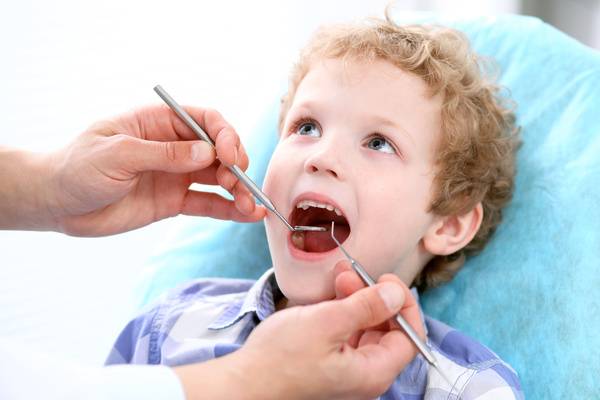Did you know that the number-one dental issue among preschoolers is actually tooth decay? By the time your child enters their terrific twos, statistics show that one out of ten children already have cavities in their teeth.
What’s more surprising is that by three years old, 28% of kids already have cavities and this increases to 50% by the time your child is five.
You may not pay much attention to your child’s baby teeth since permanent teeth will replace them anyway. Perhaps you need to think again. Dental decay in baby teeth can actually affect permanent teeth and lead to future dental problems.
Luckily, there’s plenty you can do to help prevent tooth decay in your kiddos, such as encouraging healthy eating habits, making sure they brush their teeth regularly, and regular trips to your friendly neighborhood dentist.
Healthy teeth equal a happy kid! So keep up the great work, and throw in a little humor along the way. Who knew brushing teeth could be so fun?!
The Importance of Oral Health in Pediatrics
Your little one starts their adorable baby teeth within the first six months. But as they grow, they start losing their first set of teeth around the age of 6 or 7. Don’t worry though, it’s just making room for their awesome, permanent teeth that are on their way!
Dental care is important for your kids. Your little one may suffer from oral decay and disease which can be unpleasant. For sure you wouldn’t want that.
Tooth decay is a chronic problem among children but the good news is that health experts have come a long way to making a big difference. Nevertheless, you should be on top of your child’s oral health.
Dental issues in children can be quite infectious. Even more infectious than asthma or hay fever. For this reason, the importance of oral health in pediatrics can’t be stressed enough.
Early detection is key!
Identifying tooth decay early can make a difference in managing and treating it. Plus, treating problems early on can save you money in the long run. So, schedule dental appointments and ensure your family is keeping up with good oral hygiene habits.
Catching any problems early is important in keeping those pearly whites shining bright and healthy. We at Omega Pediatrics know that caring for your little one’s teeth can sometimes feel like a daunting task, It’s crucial!
Avoid painful or frightening dental procedures.
It is common for children to be afraid of the dentist for many reasons. You can make your child’s dentist experience more enjoyable if they don’t have to go through painful or frightening dental procedures. We definitely want to avoid that if we can!
Prevent misaligned teeth.
Missing baby teeth can leave gaps that cause outlying teeth to shift or get misaligned. This prevents the permanent teeth from growing correctly, which might mean braces later on.
Foster overall health and wellness.
Oral hygiene doesn’t only mean preventing tooth decay and cavities, there’s so much more than that. The clarity of your kid’s speech and even their proper digestion also depends on it. Plus, a bright and shining smile can also foster your little one’s confidence.

How Your Pediatrician Can Support Dental Health
Your first ally in your child’s fight against tooth decay is your pediatrician. During the first year, you will most likely have frequent visits to the pediatrician. When your child gets older, your pediatrician can still offer tips that complement your family dentist.
There are instances when your pediatrician and dentist team up, particularly when fluoride needs to be applied. Also, your doctor can alert you of situations that can increase the likelihood of your child getting cavities.
Premature babies and taking certain medications increase the risk of your child getting cavities.
When to take your child to a dentist.
Your baby’s first tooth is an exciting milestone, and it’s also the perfect time to schedule their first dental visit. Your child’s dentist will show you how to brush those tiny teeth, and even fit your little athlete with the perfect mouthguard.
You will work together with your child’s dentist to set up a healthy routine for your little one, and the whole family.
The role of a pediatric dentist.
The idea of taking your child to a dentist may not always be pleasant. But no worries because with a pediatric dentist, the experience may be otherwise. They are the ones whom you want to be with when it comes to the oral health of your little one.
They’re experts at making kids feel comfortable and can handle even the most wiggly and giggly of patients. You will find that their clinic’s layout is child-friendly, making your kid relaxed during the visit.
Their clinic has equipment designed for the procedures commonly carried out for kids. You will have peace of mind that they have specialized training and are able to support your little one throughout their dental journey.
With the proper training of a pediatric dentist, you can trust them with a gentle cleaning procedure for your child, or even an intricate dental process. More often, they have a team-up with your child’s pediatrician.
From the first baby tooth to the last wisdom tooth (ouch!), these dental superheroes know just what your child needs to keep their smile shining bright.

Establishing Good Oral Hygiene Habits Early
It’s a good idea to bring your child to the dentist as soon as possible. You will be able to develop in them a positive attitude towards oral checkups. Moreover, parents who take oral health care seriously are more likely to imbibe on their children.
Setting good examples and teaching your little ones about oral health early on can make the difference in their future dental health.
Teaching kids good dental habits.
The key to keeping your child’s pearly whites shining bright is to teach them good dental habits early on. Instill in them the habit of brushing their teeth every after meal. Be consistent on this by constant reminder. Often, kids only need a little encouragement.
Even if your child can brush their teeth on their own, it is a good idea to check on them from time to time. Ensure that they’re doing it the correct way. You need to watch out for brown spots in their teeth which may indicate the onset of tooth decay.
In such a case, consult your child’s dentist on what you can do to prevent it from worsening.
When to use toothpaste with fluoride.
When your little one’s first tooth pops up, start taking care with fluoride toothpaste. Begin with a tiny smear, like a grain of rice, until your little one turns three. A rule of thumb is to brush your child’s teeth twice a day –after breakfast and bedtime.
At three years old, a pea-sized amount of fluoride toothpaste is suitable. Just remind your kiddo to spit instead of rinse. Your child will become a pro at brushing on their own by around age 10.
Toothbrushing tips
- A soft-bristled toothbrush is recommended since it won’t hurt their soft gums. Kids toothbrushes are also widely available. They usually come with rubberized and arched handles for easy and firm grip of small hands.
- Break the brushing process into small steps that your child can understand and practice. Ask a dental professional or early childhood specialist for help.
- Place your hand over the hand of your little one while they are brushing to guide them better.
- Fluoride toothpastes have become child-friendly since they come in various flavors kids will love.
- Squeeze the toothpaste onto the toothbrush yourself even if your child insists on doing it on their own. This way, you are assured that only a smear or a pea-sized amount is used.
- If your kid finds it hard to spit, let them tilt their head so that the toothpaste can simply flow out. Catch it then with a cup or washcloth.
- Use a timer, a short song, or counting as a fun game to encourage brushing for 2 minutes.
Coordinating Care with Your Child’s Dentist
When your child loses their baby teeth
As your little one grows up, their baby teeth will start to fall out, making way for their permanent teeth. The front teeth, or incisors, will be the first to go at around age 6. Then, by ages 10-12, the molars will fall out and be replaced by permanent teeth by age 13.
Most kids can’t wait to wiggle their teeth loose with their tongues or fingers and leave them for the tooth fairy. If your child asks for your help, grasp the tooth firmly with tissue or gauze and remove it with a quick twist.
In cases when the baby teeth get loosened out due to tooth decay, or perhaps an accident, then it’s likely that the permanent teeth coming out are crooked. This is because there isn’t enough space for the permanent teeth to grow properly.
Due to this, the importance of taking care of your child’s baby teeth can’t be stressed enough. In some cases when your child’s baby tooth isn’t coming out on its own, a pediatric dentist may have to extract it.
Your child losing their baby teeth is normal and part of growing up. Celebrate this big milestone with your little one!
When your child suffers from a toothache
It can be more distressing for parents to see their child suffering from a toothache or mouth pain. Here is the steps:
- Ask your child to point to the specific area or tooth that hurts.
- Observe your child if he drools or part of the face is swollen. Also, check for pimple-like lesions around any tooth.
- You might need to provide first aid. Rinse his mouth with warm water. Then, with a dental floss, remove any food caught between the teeth and causing pain. If the tooth is loose, take note.
- See your child’s dentist, or health provider, as soon as possible..
When your child faces a dental emergency
It is a good idea to know what to do in cases of a dental emergency. You should be able to act quickly and decide the next best action. The sooner you bring your child to a dentist or to the emergency room, the better.
Tips to Avoid a Dental Emergency
- Let your child wear a mouthguard if they are into sports or any heavy activity.
- Don’t let your kid run around with objects in their mouth.
- Children learn from adults so if you are used to using your teeth as a cutting tool, break this habit so your little one won’t follow.
- Use child-proof gates to block stairways, especially if you have small children.
- Schedule bi-annual dental visits to ensure healthy and strong teeth.

See Your Child’s Dentist For Good Oral Health
Being on top of your child’s oral health will benefit them as they grow their permanent pearly whites. This means that even if your child has only baby teeth, oral health hygiene is just as important.
Fostering healthy oral habits starts with you, as parents, by setting a good example. You’lll have a greater chance of preventing tooth decay, and other serious dental health issues for your little one.
Your doctor at Omega Pediatrics and your child’s dentist are your allies in this fantastic health journey. So let’s keep those smiles bright and healthy!
Give your child’s pediatric dentist a call today and have them check your child’s oral health. Feel free to call us at Omega Pediatrics if you are looking for someone local for your chiild’s dental care. We have a curated list for you to choose from.



